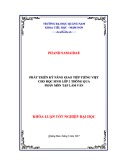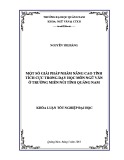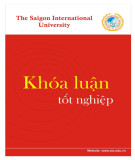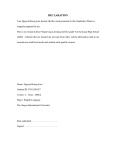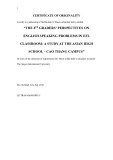
Student Name and Code:
Nguyễn Phạm Lan Chi – 2100011504
Major:
English Language
Course:
Scientific Research Methodology
Lecturer:
Trần Quốc Tuấn
Title: Impact of English Videos on Facebook Platform on Speaking Skills of Freshmen
at Nguyen Tat Thanh University
Scientific Research Methodology
NGUYEN TAT THANH UNIVERSITY
FACULTY OF FOREIGN LANGUAGES
SCIENTIFIC ARTICLE
Title:
THE IMPACT OF ENGLISH VIDEOS ON THE FACEBOOK PLATFORM ON
SPEAKING SKILLS OF FRESHMEN AT NGUYEN TAT THANH UNIVERSITY
Subject: RESEARCH METHODOLOGY
Student’s full name: Nguyễn Phạm Lan Chi
Student’s code: 2100011504
Lecturer in charge: Tran Quoc Tuan, M.A
Ho Chi Minh City, May 2024

1
Contents
ABSTRACT .............................................................................................................................. 2
I. INTRODUCTION ................................................................................................................. 2
1.1. Introduction .................................................................................................................... 2
1.2. Research question ........................................................................................................... 3
II. LITERATURE REVIEW ..................................................................................................... 3
2.1. Role of Social Media in Language Learning: ................................................................ 3
2.2. Effectiveness of Video-Based Learning: ........................................................................ 3
2.3. Impact on Speaking Skills: ............................................................................................. 4
2.4. Motivation and Engagement: ......................................................................................... 4
2.5. Challenges and Limitations: ........................................................................................... 4
2.6. Cultural Considerations: ................................................................................................. 4
2.7. Future Directions: ........................................................................................................... 4
2.8. Conclusion ...................................................................................................................... 5
III. RESEARCH METHODOLOGY ....................................................................................... 5
3.1.Participants and framework: ............................................................................................ 5
3.2. Analytical framework ..................................................................................................... 6
3.2.1. Pretest and Posttest ................................................................................................... 6
3.2.2. Questionnaire results ................................................................................................ 6
3.3. Data analysis and discussion of findings ........................................................................ 7
IV. RESEARCH RESULTS ................................................................................................... 14
4.1. Quantitative Results: .................................................................................................... 14
4.2. Qualitative Results: ...................................................................................................... 14
4.3. Integrated Analysis: ...................................................................................................... 14
V. DISCUSSION AND RECOMENDATION ....................................................................... 15
5.1. Discussion:.................................................................................................................... 15
5.2. Recomendation: ............................................................................................................ 16
5.2.1. Curate High-Quality Content: ................................................................................ 16
5.2.2. Encourage Active Engagement: ............................................................................. 16
5.2.3. Foster Community Building: ................................................................................. 16
5.2.4 Integrate Technology-Enhanced Learning Tools:................................................... 16
5.2.5. Provide Guidance and Support: ............................................................................. 16
VI. CONCLUSION................................................................................................................. 17
VII. REFERENCE .................................................................................................................. 18

2
THE IMPACT OF ENGLISH VIDEOS ON THE FACEBOOK PLATFORM ON
SPEAKING SKILLS OF FRESHMEN AT NGUYEN TAT THANH UNIVERSITY
NGUYEN PHAM LAN CHI
ABSTRACT
This study explores if English videos on Facebook can improve speaking skills for
freshmen struggling with English. We will divide freshmen into groups: one exposed to
curated English videos on Facebook and another with no intervention. Both groups will
take speaking tests before and after. By analyzing these tests, we aim to see if the
Facebook group improves their fluency, vocabulary, and pronunciation, promoting better
English proficiency.
Keywords: explore, video, improve.
I. INTRODUCTION
1.1. Introduction
Effective comm unication skills are crucial for success in university studies and future
careers. Speaking skills, in particular, play a vital role in academic discussions,
presentations, group work, and class participation. In today's digital age, social media
platforms have emerged as powerful learning tools, offering students access to diverse
educational resources beyond traditional classroom settings.
One such platform, Facebook, boasts a vast collection of English-language videos on
many topics. These videos, created by native speakers or proficient learners, can potentially
present an engaging and accessible approach to language learning. They can expose
students to authentic spoken English in various accents and contexts, potentially enhancing

3
their pronunciation, vocabulary, and fluency.
However, the effectiveness of using English videos on Facebook for developing
speaking skills remains under-explored. Existing research often focuses on language
learning apps, online courses, or formal learning environments. Little is known about how
readily available resources like Facebook videos can supplement traditional language
learning and impact the speaking skills of university freshmen who are typically
transitioning from a more controlled learning environment to a setting that demands more
spontaneous speaking.
This study aims to bridge this gap in knowledge by investigating the potential impact
of English videos on Facebook on the speaking skills of freshmen at university. By
examining how freshmen utilize these resources and analyzing the perceived benefits and
drawbacks, this research seeks to contribute to the understanding of informal learning
practices and their influence on spoken English proficiency in an academic context.
1.2. Research question
1. The impact of watching English videos on Facebook on speaking skills?
2. Expanding vocabulary and improving grammar through English videos on
Facebook?
3. Improving listening comprehension and reflexes in English communication by
watching English videos on Facebook?
II. LITERATURE REVIEW
2.1. Role of Social Media in Language Learning:
Social media platforms have become integral tools for language learning due to their
accessibility and interactive nature (Al-Maroof & Al-Azawei, 2016). Facebook, being one
of the most popular social media platforms globally, offers various opportunities for
language exposure and practice.
2.2. Effectiveness of Video-Based Learning:
Video-based learning has shown promising results in language acquisition, as it
provides authentic language input and promotes engagement (Almarza, 2016). English
videos on Facebook can offer diverse content ranging from educational materials to

4
everyday conversations, catering to different proficiency levels.
2.3. Impact on Speaking Skills:
Research suggests that exposure to authentic spoken language through videos can
enhance speaking skills by improving pronunciation, vocabulary, and fluency (Thorne,
Black, & Sykes, 2009). Interaction with English videos on Facebook may encourage
freshmen to practice speaking independently, thereby boosting their confidence and
proficiency.
2.4. Motivation and Engagement:
Social media platforms like Facebook offer a dynamic learning environment that can
motivate language learners through peer interaction and real-world content (Junco,
Heiberger, & Loken, 2011). The interactive nature of videos encourages active
participation, sustaining learners' interest and engagement.
2.5. Challenges and Limitations:
While English videos on Facebook can be beneficial, there are challenges such as the
lack of quality control over content and potential distractions (Junco et al., 2011).
Moreover, the effectiveness of video-based learning depends on learners' self-regulation
and ability to transfer skills to real-life communication situations.
2.6. Cultural Considerations:
It is essential to consider cultural relevance when utilizing English videos on
Facebook for language learning, ensuring that content reflects the cultural backgrounds and
interests of learners (Thorne et al., 2009). Incorporating culturally diverse content can
enhance learners' understanding and appreciation of English as a global language.
2.7. Future Directions:
Further research is needed to explore the long-term impact of English videos on
Facebook on speaking skills among freshmen at Nguyen Tat Thanh University.
Additionally, investigating the effectiveness of specific video genres or instructional
strategies can provide insights for optimizing language learning experiences on social
media platforms.
By synthesizing existing literature, this review provides a foundation for

